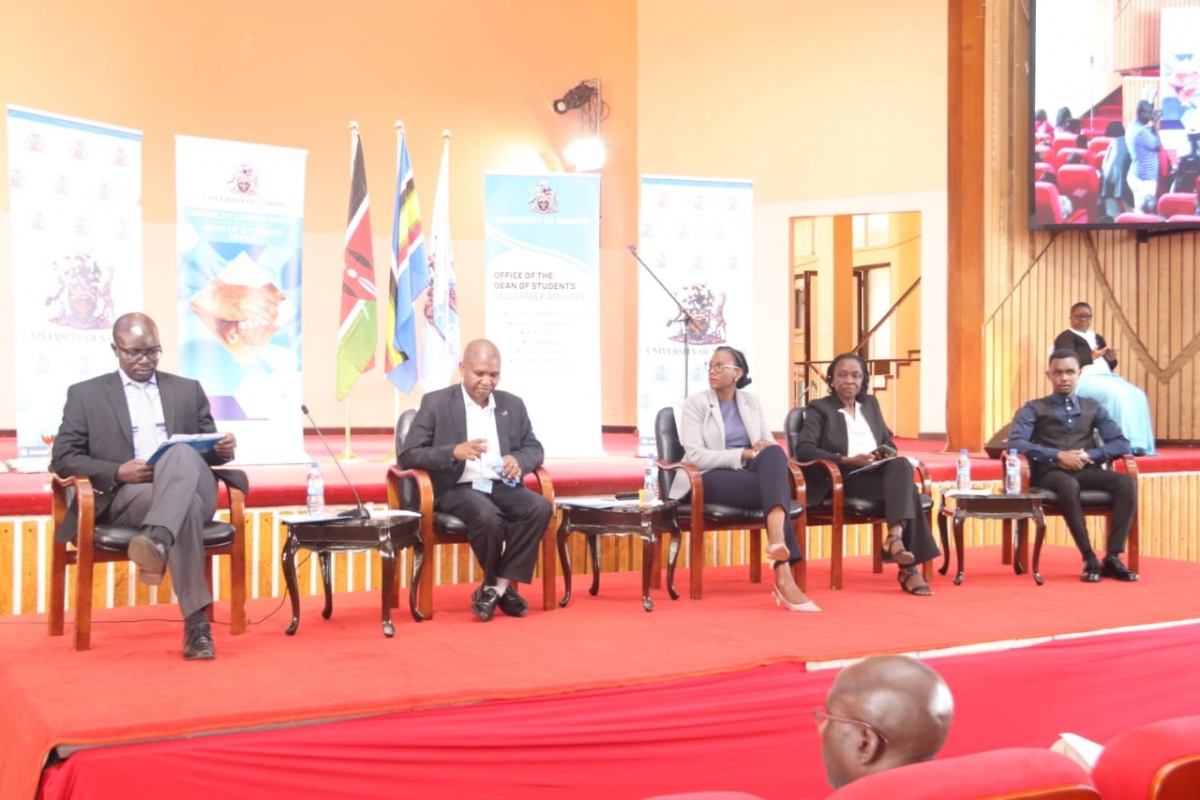Varsity hosted 2nd International Day of Persons with Disability (IDPWD)
Institutions of Higher Learning have a role to play in achieving 5% inclusivity of PWDs at the workplace.
The University of Nairobi joined the rest of the world in celebrating the International Day for Persons Living with Disabilities (PWD) on Friday, 2nd December 2022. This year’s celebrations sought to create awareness around PWDs through their Participation in Higher Learning Institutions to ensure a more inclusive, accessible and equitable world.
The commemoration was marked with Inter-university adaptive sports; wheel chair basketball, para chess, darts, registrations of PWDs by the National Council of Persons with Disability (NCPWD) and a panel discussion.

2, 2022 in Taifa Hall
“As a Professor in human anatomy, I understand and relate wholeheartedly with persons with disabilities and I will continue to champion for their needs and rights,” said Prof. Julius Ogeng’o Deputy Vice Chancellor Academic Affairs as he pledged his support to PWDs.
In her keynote address, Ms. Joyce Kibe, Head of Corporate Affairs and Brand Marketing at Standard Chartered Bank said that there are opportunities for institutions and more intimately for individuals to be inclusive in their daily lives.
“Out of the total number of students living with disabilities who transition, 25% dropout by year one and 35% dropout by year two. This is because they do not have a sense of belonging at institutions of higher learning.” Said Ms. Kibe
The role of industries and institutions of higher learning in matters disability mainstreaming is to enable a meaningful integration of PWDs in their respective capacity in the society.
Therefore, a panel moderated by Prof. Collins Odote, Associate Dean Faculty of Law and Chairperson of the Disability Mainstreaming Committee at UoN, dove into a discussion that aimed to offer insights on the challenges institutions are facing and how they are working to ensure the percentage is attained. The guiding question was how Universities and Industries can be catalysts for the realization of 5% employment opportunities for Persons Living with Disabilities.’
Ms. Mokoena Nontsikeleo, Human Resource partner at BAT and one of the panelists stated, “The industry has to contend with the bias that they have on these matters whether consciously or unconsciously by being very aggressive with the 5% employment inclusion.”
Similarly, Mr Fredrick Ouko, the Founder of Riziki Source challenged institutions of higher learning and the industry to ensure that their curriculum and human resources or talent acquisitions respectively are accessible and suitable to the needs of People Living with Disabilities.
“Institutions of higher learning in my time were not accessible and situation hasn’t changed much. I had to drop some units because of that; Industries on the other hand, are discriminatory in job advertising. For example, how do you advertise for a job in print media and expect a visually impaired person to apply for it? How do you invite a deaf person to an interview without an interpreter and expect to acquire that talent?” he said.
In emphasis, Ms. Stephanie Bitange representing Hon. Geoffrey Kaituko, Principal Secretary Labor and Skills development called on institutions of higher learning to ensure that they are inclusive all year round and not just on days that are marked to celebrate Persons with Disabilities.
“It is a shame that the University had a year to ensure that this day was better than last year’s by ensuring that there is a ramp to the podium but they didn’t. This is just an example of how other institutions view the importance of remodeling their infrastructure to ensure an inclusive and enabling environment for PWDs.” She emphasized.
Additionally, Andrew Kyosi, UNSA Council representative for students with disabilities reminded members present on the investment that needs to be made to ensure that institutions achieve inclusivity and students have a sense of belonging.
“Disability is expensive especially when it comes to the purchase of assistive devices. Purchasing of braille is approximately 6000 US Dollars. The budget allocation does not even cut it. How then do we ensure that the students with disabilities transition to both institutions of higher learning and are absorbed by work industry?” He asked.
However, these institutions have made several strides towards a more sensitive and inclusive environment for persons living with disabilities. For instance, the University of Nairobi has established a Disability Inclusion policy whose framework and strategy aims to bring about impactful change in the university.
“The University of Nairobi is the only University in Kenya that has a Disability Inclusion Policy which was established in 2020 and approved by the National Council of Persons with Disability (NCPWD).” Said Prof. Collins Odote.
To add to that, Mr. Kinyua, Dean of Students said, “UoN has partnerships with corporates to ensure that students with disabilities transition to work industries without having to ‘tarmac’. We have 26 students who hope to transition to the workforce and 8 of those have already transitioned.”
“Of the 20 students that we recruited in the leadership program, all of them are students living with disabilities.” Said Ms. Mokoena Nontsikeleo.
Similarly, the government has a project that distributes aid to over 47,000 households in Kenya with persons with severe disabilities and a project that is set to be rolled this financial year that will support people with developmental disabilities like autism.
In conclusion, Ms. Joyce Kibe made a clarion call to everyone to ensure that they are inclusive at an individual level.
“When you look at your circle of friends, is it inclusive?” she asked.
